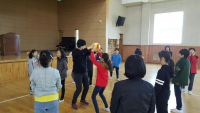
Purpose This study aimed to investigate the psychological capitals created by the experience of winning an Olympic medal by using the photovoice method. Methods Data were collected on the way the participants-five Bronze medalists in the Women's volleyball in 1976 Montreal Olympics-take and send photographs. The interviews were conducted by phone based on the collected data. The photographs were placed into the parent category after conducting inductive content analysis, and their validity was confirmed from the expert meetings. Results The results of the study, indicate that the participants have earned psychological capitals such as my matter volleyball for diligence, the gift of a Bronze medal to gratitude, the source of achievement, challenges, and key of relationship tenderness from the experience of winning an Olympic medal. Conclusion In this regard, this study provides an opportunity to extend the study on the lives of retired athletes who won an Olympic medal to various perspectives, as well as the impact of sports experience on everyday life.










This study was to explore the factors influencing Olympic performance positively and negatively. In order to achieve this purpose, 60 athletes, who participated in 2012 London Olympic games, responded on open-ended questionnaire. In addition, 10 athletes, who won medals in London Olympic, responded on in-depth interview. Collected data were analyzed by deductive content analysis. The results of this study were as follows: firstly, the factors influencing Olympic performance positively were psychological preparation, strengthening training, physical conditioning, support from significant others, material support, cheering of Korean people, self respect as a Korean national athlete, different game environment, team cohesion, sharing Olympic experience, and support of sports science. Secondly, the factors influencing Olympic performance negatively were psychological pressure, excessive expectation, negative interpersonal relationship, condition decline, overtraining, unstable environment, insufficient facilitation, decrease in performance level, and especially ineffective village room placement and media management during Olympic period. Thirdly, the differences between Olympic games and other world competitions , perceived by athletes were competition scale, psychological attitude, training support, systematic preparation, and benefits from winning medals. The results of this study will give fundamental information in developing a scale which can measure Olympic preparation level and in developing Olympic preparation guideline. Therefore, it will help athletes ,who participate Olympic for the first time or athletes who did not perform well in pre-participated Olympic games, to understand and apply in training the factors influencing Olympic performance and help them to perform better in Olympic games.

[Purpose] This study was designed to explore Yuna Kim’s psychological strengths and the contextual factors, which led her to obtain the gold medal and the reflection of peak performance and preparation at the 2010 Olympics. It was hoped that by sharing the experience of one of the top athletes, other athletes would learn from her and prepare themselves better for Olympics in the future. [Methods] A case study method was applied with a qualitative approach. To obtain the purpose of the study, five in-depth interview sessions including introductory and member checking procedures were conducted. The interviews were recoded and transcribed verbatim, and content analysis was used to inductively analyse the data. [Results] The four general dimensions that were discovered in the results included Social-external Factors, Personal Traits, Coping Strategies, and Peak Performance. The social-external factors consisted of social support and attached/detached relationships while personal traits were personality traits, confidence and motivation. Coping strategies to overcome external and situational pressures were detached coping and resilience whereas peak performance was reflected on flow and the state of being mindful. [Conclusion] In conclusion, Yuna Kim’s strength was parallel with the previous research on the top athletes and other findings such as adaptive perfectionism and a sense of rivalry in the research were discussed.
